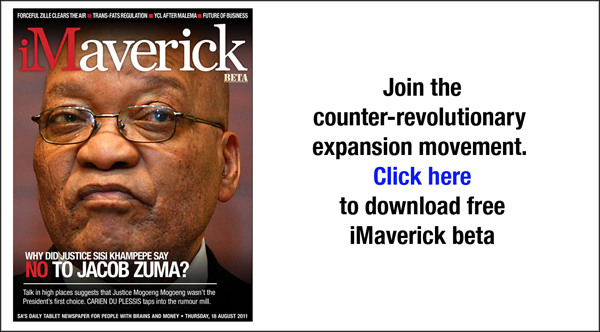Is this overly harsh on Judge Mogoeng Mogoeng? It depends. But look at the track record:
He’s the youngest judge on the Constitutional Court. He’s been there for just two years, and he is just 50 years old. That’s approaching worryingly mature for journalists, but not for judges. We like them old. And wise. And thoughtful. We don’t like them young, emotional and passionate. Mogoeng is all three. During his Judicial Service Commission hearing for the Constitutional Court back in 2009, he spoke with all the fiery passion of a preacher. Which is what he is. The Presidency statement put out yesterday, confirmed that he in fact an ordained pastor. Fascinating how here, that is the last piece of information in a presidential statement. There’s no way it would be an afterthought in some other countries that separate church and state. In the US, that alone could be enough to start a small war.
Now to Mogoeng’s experience as a judge. He was in the wonderfully massive northern metropole of Mafikeng for 10 years, eight of them as Judge President of the North West. I’ll stop being nasty for a moment to say that this has given him much experience in case-flow management. He’s also been heavily involved in a task team looking at this issue. So when Zuma says he’s experienced, he’s not entirely wrong. And the office of the chief justice is being tasked with fixing the delays that seem to plague our courts, so this could serve him well.
But, to a cynic, that’s not why Zuma has picked him. If managerial skill was the main issue, well why not the person running the Supreme Court of Appeal, Judge Lex Mpati. No, this is about something else. When it comes to running the rule over judges, it’s best to start with judging their rulings.
A brief look at Mogoeng’s judgments since he was appointed to the Constitutional Court in 2009, show a deeply conservative streak. Because of the way judges work, it’s his dissents that are the more interesting. Two of them stick out. The first is in the case of Le Roux vs Dey (Ed’s note: Stephen has been particularly emotional about this case, perhaps because he’s a parent). It’s a matter in which schoolboys were sued for defamation by a high school teacher. They had digitally manipulated pictures of the teacher to purport to show him having homosexual sex. That image found its way onto the school’s notice board for a time. When the case found its way to Braamfontein, the court ruled in a three-way split. Mogoeng dissented from the two other rulings. That’s not the issue. What is key here is that he didn’t explain why he dissented. It’s the done thing to write a judgment if you dissent. As UCT Constitutional Law Professor Pierre de Vos wrote at the time on his blog, Constitutionally Speaking: “The principles of openness, transparency and accountability which judges of the highest court should be particularly attuned to, has not been served by this silence. Justice Mogoeng has, in my opinion, therefore unwisely failed to embody the culture of justification demanded by our Constitution.” The point is that we don’t know why Mogoeng dissented because he hasn’t told us. He has let us down.
The second relates to the case involving former Ekhuruleni Metro Police Chief Robert McBride and The Citizen newspaper. It revolved around whether the paper had been wrong to call McBride a “murderer” after receiving amnesty for committing murder. It’s a great issue for debate. Here, in another dissent from the two main rulings in the case, Mogoeng wrote something that could be interpreted as worrying for freedom of speech. He says, “Black South Africans have been subjected to untold indignities for centuries. It is partly for this reason that the value of human dignity and the right of all to have their dignity respected and protected features so prominently in the Constitution. This right is just as important as the right to freedom of expression and should not be relegated to near insignificance at the appearance of the right to freedom of expression”. It’s a mouthful, but one interpretation of this line of thought could be that Zapiro should not allowed to take the mickey out of Zuma – the right to dignity is as important as the right to freedom of expression. You can imagine what Mogoeng may feel about that showerhead.
This apparent conservatism might well appeal to Zuma, and might be the main reason he’s been appointed.
That’s the who and the why.
But what kind of power will Mogoeng, as Chief Justice actually have.
Firstly, he is just another Constitutional Court judge. His ruling carries as much weight as the others. And there will have to be another nomination process to fill the spot left by Judge Sandile Ngcobo, so the balance of the court could actually tilt in a progressive direction through all of this. Where Mogoeng could have real power though is on the JSC itself. He will be its chair. He will be in charge of disciplinary proceedings against other judges. Were there ever to be another case as politically controversial as that of Judge John Hlophe’s, his role could be crucial to how it unfolds. And bear in mind, Hlophe’s issue hasn’t been settled yet.
He will also have power as the leader of the new office of the Chief Justice. It’s getting muscle as legislation has been changed to make the judiciary more independent. This means that Mogoeng will possibly have more power over the day-to-day running of things than Ngcobo and Pius Langa before him. That doesn’t mean he has more power over actual rulings, but sometimes controlling the mechanics of a process can be all you need.
Zuma’s announcement on Tuesday is officially a “nomination”, not an appointment. He still has to engage in “consultation” with opposition parties and the JSC. But constitutionally, this appointment is the President’s gift. The only way it could be challenged would be for someone to go to court and argue that Mogoeng is not “fit and proper” or not “suitably qualified”. So Mogoeng it will be. Until 2021. That’s when his current term on the Constitutional Court expires, and when he will have to stand down.
Overall then, is this deeply worrying? If you’re a progressive who believes in the strong separation of powers, then the answer has to be yes. Mogoeng appears conservative and executive-minded. In other words, it seems he’s likely to rule in government’s favour fairly often. But, there are nearly two presidential terms between now and 2021. Things change. Can you imagine if Zuma doesn’t survive Mangaung and is out of office in 2014? And if his replacement can’t stand Mogoeng, but is stuck with him for some time? Then those who believe in the separation of powers will be happy again. DM






